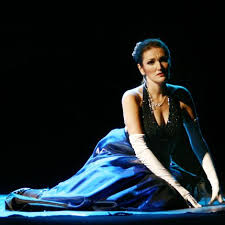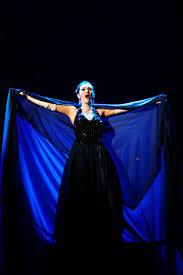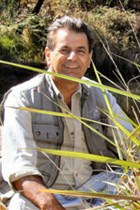
Top stories






LifestyleWhen to stop Googling and call the vet: Expert advice on pet allergies from dotsure.co.za
dotsure.co.za 16 Feb 2026
More news


Marketing & Media
Ads are coming to AI. Does that really have to be such a bad thing?














When she took her bow at the end, the audience broke into a roar of approval, combined with whistling, clapping and cries of 'Bravo!' She had clearly touched a chord in the audience.
How is it possible to generate such emotion, I wondered?
Three days later I met her.
Do you not get an attack of nerves before you sing before a large audience? I first asked, referring to her City Hall performance. "Of course," she replied, "I have butterflies in my stomach right up to the moment I start to sing - then something else takes over."
With disarming humility she will confess that she receives her emotional guidance from the music, often from the very first chord. "Lyrics, on the other hand, provide a framework on which to hang the mystery of song and, together with music, I am able to create unique meaning and emotion. I feel pure joy when I give through song - it's as if I'm giving something unique to my audience, and in a strange way I'm also giving expression to myself."
Audiences can make or break a performance and play a more important role than they realise. In fact, a great performance is born when the audience resonates at the same emotional frequency as the singer. When that happens, the singer and the audience give back one to the other. A sort of positive, self-energising feedback loop is set up. This is why a great performance is such an uplifting, energising experience. It extends, enriches and colours our emotional universe and leaves us feeling peaceful and fulfilled. Perhaps this is why Beverley was able to capture the hearts and minds of her audience in the way she did.
Neuroscience research supports the idea that pleasurable emotions are key motivators for listening to music. Brain scans visually prove that music activates the "pleasure centres" in our brain, and can induce a range of powerful emotions.
Emotional reactions to music are inevitable and play a significant role in our evaluation of music.
The various attributes of music, such as intensity, tempo, dissonance, harmony and pitch strongly relate to our emotional states. For example, low-intensity and slow-tempo music results in a calm relaxing state, whereas loud, high-tempo music reflects a more excited emotional state.
According to psychologist and writer Jane Collingwood, listening to appropriate music can have a wonderfully relaxing effect on our minds and bodies. It can have a beneficial effect on our physiology, slowing the pulse and heart rate, lowering blood pressure, and decreasing the levels of stress hormones.
As musician and mezzo soprano Marita Botha puts it: "Talking makes us focus on words and ideas, whereas singing adds another dimension and hits a button deep in our primitive brain. It makes the whole experience just that much more emotional and perhaps more engaging. We are moved by the experience of song, more than we are by simply reading or talking for example. Music and song push buttons that nothing else can access."
To get to the bottom of this mystery is virtually impossible. In essence, music exists to speak the words we can't express. As Marita puts it: "Trying to pin down our emotional involvement with music is like trying to pin down water."
Soprano Beverley agrees: "Experiencing music and song lifts one to another level and transports the listener to another place, which is why people listen."

When Beverley stood to sing, graceful in her regal full-length blue-pleated dress, one was taken aback by the purity of her voice, which reflected exquisite power and intent. It seemed almost unreal that such a slim figure of a woman could fill the vast City Hall and mesmerise an audience with a textured, emotionally rich voice that rode the thermals high above the powerful orchestra.
Her voice was clear and focused with a surprisingly supple yet controlled vibrato, which clearly resonated with the audience. Technique plays a vital role here.
As voice teacher, Beverley regards the larynx and the human body as an instrument that any proficient singer has to learn to master, and this takes imagination and discipline. Voice control involves far more than manipulation of the larynx. Other factors include the interplay between sinus and other resonances, facial expression, the mouth cavity and open throat, manipulation of the soft palate and breath control.
The throat may be the centre of self-expression, but in truth the entire body sings. The combination of these factors determines the size and the range of the voice and into which category of singer you are classed. Coloratura soprano Beverley's short rendition of Puccini's O Mio Babbino Caro clearly demonstrates how the body sings.
"Audiences love to hear a singer sing," says Beverley, "it's as if the human body is transformed into an exquisite and unique musical instrument. People often think that a beautiful voice just comes naturally, when, in fact, it's the result of years of solitary training, discipline and mentoring".
Music remains a miracle. As actor Robin Willams vocalised in August Rush, before his untimely death: "Music is God's little reminder that there's something else besides us in the universe; harmonic connection between all living beings, everywhere, even the stars."
